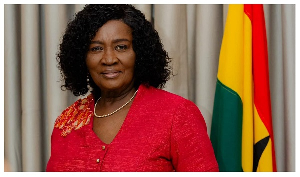Ursula Owusu-Ekuful, the Member of Parliament for Ablekuma has revealed the circumstances the led to her exit from mobile telecommunication company Zain.
In an interview with Asempa FM, the Minister for Communications and Digitization disclosed that she was handed a disengagement letter a day after late John Evan Atta Mills was sworn in as president in 2009.
Ursula Owusu-Ekuful says the ‘disengagement’ was not based on her competence or any form of misconduct but due to her association with the NPP.
“I was working with Zain. After the company was sold, I was still taking as their corporate and external affairs director for Zain so I was working there. I was handed disengagement letter 8TH January 2009. The significance of the date, one day after the swearing-in of Professor John Atta Mills.
“The company felt that due to my public statements on national issues and criticism of the NDC party, once the NDC was in power they can’t work with me. It wasn’t a reflection of the kind of work I was doing there. They said it themselves that I was doing a good job. Nothing had happened except the coming in of a new government. I lost my well-paying job,” she said.
Ursula says the dismissal paid off as it gave her the freedom to continue her take her attacks on the NDC.
“So I vowed that those who made me lose the job, I will make them rue the day. Since then my comments on national issues went from seemingly objective to full-blown partisanship. I went all out and that’s what happened,” she said.
Ursula was reacting to claims by Sir Sam Jonah that culture of silence is pervasive under the Akufo-Addo government.
“I don’t think people are no longer talking…it is not the government that is preventing people not to speak either by force or coercion or fear or intimidation. There is a multiplicity of channels in which people express themselves. In the past, it was only the TV and radio stations as well as the newspapers that people feel to express their views, today, everybody can express his or herself provided he or she has a smart device and publish it globally on Social Media.”
“Who is preventing who? Maybe we don’t understand the definition of culture of silence and maybe that is where the conversation should start. What do we mean by a culture of silence?” she quizzed.
“In those days, you are afraid to talk. We fear those in power, so, your thoughts remain in your head. Opening your mouth to speak about issues, the next minute, where you sleep changes, if you are not lucky, you won’t return to your family.
“So, the fear to speak which is enforced by the state was what was keeping people from talking; is that the same situation he [Sam Jonah] is speaking about?” Ursula Owusu-Ekuful questioned further.
She added, “his use of the culture of silence, I don’t really understand. It is like comparing apples and oranges; if it is the same situation, we were under the military regime which made Adu Boahen’s and PV Ansah’s challenge the status quo, which coercive power of the state is preventing people from criticizing the government?”
General News of Thursday, 29 April 2021
Source: www.ghanaweb.com
Zain sacked me a day after Atta Mills was sworn-in as president – Ursula Owusu-Ekuful
Entertainment












